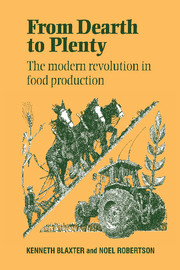Book contents
- Frontmatter
- Contents
- Preface
- Acknowledgements
- PART ONE The social, economic and political context of agricultural change
- PART TWO The science and technology of the modern agricultural revolution
- 3 Problems of measurement
- 4 Mechanisation
- 5 Soils, fertilisers and water
- 6 The control of weeds, pests and plant diseases
- 7 Breeding more productive plants
- 8 Integrations and innovations in crop husbandry
- 9 Hunger in the midst of plenty
- 10 Better and more productive animals
- 11 Animal health and disease
- 12 Integrations in animal husbandry
- PART THREE How did the science-based revolution happen, and what is the way forward as support is withdrawn?
- Glossary
- Index
9 - Hunger in the midst of plenty
Published online by Cambridge University Press: 04 August 2010
- Frontmatter
- Contents
- Preface
- Acknowledgements
- PART ONE The social, economic and political context of agricultural change
- PART TWO The science and technology of the modern agricultural revolution
- 3 Problems of measurement
- 4 Mechanisation
- 5 Soils, fertilisers and water
- 6 The control of weeds, pests and plant diseases
- 7 Breeding more productive plants
- 8 Integrations and innovations in crop husbandry
- 9 Hunger in the midst of plenty
- 10 Better and more productive animals
- 11 Animal health and disease
- 12 Integrations in animal husbandry
- PART THREE How did the science-based revolution happen, and what is the way forward as support is withdrawn?
- Glossary
- Index
Summary
Farmers are very observant people. They recognise land on which their livestock fail to thrive and often how animals recover when moved to other pastures or when given alternative types of feed. The reasons farmers suggest for the shortcomings of these unsatisfactory grazings are many, ranging from poverty of soil to the presence of flukes or other parasites or of some plant that might be noxious. The alternative of blaming the animals by classing them as ‘poor doers’ is rarely considered because it is characteristic for some maladies to continue year after year on the same land irrespective of the source of the grazing stock. Furthermore it is recognised that some of these problems are not limited to individual farms but involve whole districts around them. Had farmers in the past been afforded the opportunity to travel they would no doubt have recognised that they were not alone. They would have seen that vast areas of land all over the world are limited in similar ways and there too animals starve and die in the midst of an apparent plenty.
The discovery of the causes of these serious limits placed on animal production has been the result of an international effort in which British scientists have played no small part and in which, in the best traditions of science, there has been excellent collaboration. A few examples are given here.
- Type
- Chapter
- Information
- From Dearth to PlentyThe Modern Revolution in Food Production, pp. 166 - 184Publisher: Cambridge University PressPrint publication year: 1995



